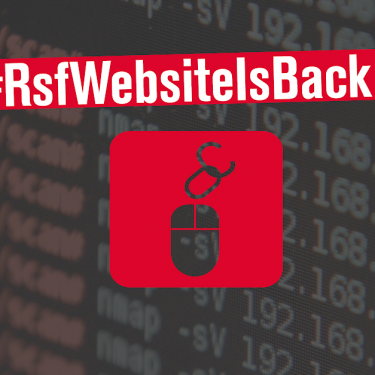On first anniversary of blocking, RSF restores access to its site in Egypt

Access to hundreds of websites are blocked in Egypt, placing journalists in a virtual jail. To draw attention to this censorship, and to circumvent it, Reporters Without Borders (RSF) is making its own website accessible again in Egypt today, exactly one year after it was first blocked there.
The Egyptian government still has a long way to go on the digital revolution road although the then communication minister boasted last year of how it was encouraging the development of telecoms, the Internet of things and other new technologies, describing them as a “human right.”
RSF suggests that a simpler path to digital progress for the Egyptian regime would be to stop systematically blocking hundreds of websites, including news websites. And to help show the way, RSF is unblocking its own website in Egypt today – a year after it was first blocked – by means of the website “mirroring” technique used in RSF’s Operation Collateral Freedom.
>>> Go to RSF’s site in Egypt <<<
Around 100 news websites, including Al Jazeera, Al Bedaiah, Huffington Post Arabic, Medium and BuzzFeed, were among the sites that were blocked last year in Egypt, according to a study published jointly last month by the Open Observatory of Network Interference (OONI) and the Association for Freedom of Thought and Expression (AFTE).
Lina Atallah, editor-in-chief of the independent site Mada Masr, told AFTE: “We were working normally and suddenly we could not access the Mada site. At the same time, news appeared on pro-regime websites that a group of websites were blocked. Eventually it became clear that the block policy was a systematic policy and not just affecting a group of websites.”
What crime had Mada Masr and the other censored sites committed? Failing to publish pro-government content. The Lebanese daily Al Akhbar, for example, was censored after publishing a story about the resignation of Egypt’s intelligence chief.
Various sources have told RSF that deep packet inspection (DPI) is one of the main methods that the Egyptian authorities use to block sites. The few entry and exit points giving access to the Internet in Egypt have been placed under the regime’s control. Packets – meaning requests by users and the data they receive – are filtered at these highly strategic digital toll booths. Website addresses (URLs) and, in general, previously identified data can be blocked automatically by equipment sold by commercial companies, without any need for human intervention.
Operators carry out Sisi’s orders (or go to prison)
The installation of DPI equipment and other censorship methods requires the cooperation of mobile phone and Internet operators. Even international operators that claim to observe international human rights and free speech standards – such as Vodafone, which has 6,500 employees in Egypt and 40.3% of its market – are forced to comply with the regime’s oppressive practices. If they didn’t, their employees could be jailed and they could lose their licence to operate in a country with an Internet penetration rate of 42% and the promise of interesting market progress in the coming years.
“Online censorship is one side of the oppressive system that the regime wants to extend in Egypt,” said Elodie Vialle, the head of RSF’s Journalism and Technology desk. “It entails putting journalists ‘on mute’ in order to make it easier to spread pro-government content. The other side is the technology used to spy on them, which in some cases is sold by European companies. RSF calls on the democracies to condemn the Egyptian regime’s closed, censored and monitored Internet model.”
Preventing sale of surveillance technologies
The democracies are not taking the right road. Or it is very circuitous one. The French company Amesys, for example, has sold its surveillance system to the Egyptian authorities. A European Commission proposal currently being discussed would reinforce the constraints on surveillance technology exports. But nine EU member states, including Sweden and Finland, are trying to block the proposal.
The not very festive first anniversary of the blocking of many sites, including RSF’s, comes at a time when the regime is yet again tightening its grip on the Internet. A cyber-law adopted in mid-July is designed to legitimize existing oppressive practices, although they contravene article 57 of Egypt’s 2014 constitution, which guarantees access to news and information, protects press freedom and restricts censorship.
Ranked 161st out of 180 countries in RSF's 2018 World Press Freedom Index, Egypt is currently one of the world’s biggest jailers of journalists.



